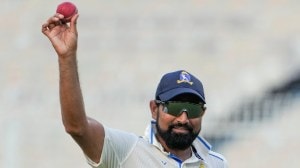Stay updated with the latest - Click here to follow us on Instagram
Uncommon flu goes viral in city
Doctors grapple with a severe flu-like strain; dengue combines with typhoid to make patients suffer more.
Doctors grapple with a severe flu-like strain; dengue combines with typhoid to make patients suffer more
The citys health officials,already grappling with a spurt in dengue and malaria cases over the past few weeks,have a stupefying problem on hand as the common viral flu has taken a rather aggressive form.
The spectrum of virals and similar infections this season have become a reason to worry as hospitals have reported that patients afflicted with the illnesses were showing severe symptoms and longer recovery period.
The old adage that any fever beyond 4-6 days is usually not a viral has taken a beating. We have now begun to question that theory,considering the disease profile of the patients we are getting, Dr S Chatterjee,senior consultant in Apollo Hospitals internal medicine department,said.
The recovery time,doctors said,has gone up to 10 to 12 days and the symptoms also varied.
We have a range of symptoms from fever and persistent joint pain to symptoms resembling encephalitis,meningitis and hepatitis. We are calling them viral-like diseases because most are showing negative test results for all identified viruses. Even the atypical pathogen profile,a test that diagnoses virals like influenza and H1N1 outside the spectrum of dengue,chikungunya and viral hepatitis,is not showing positive results, Dr Vikas Ahluwalia of Max Hospital,Saket,said.
In such a situation,doctors put these diseases in the broad category of viral-like symptoms – meaning the bug cannot be properly identified.
The symptoms are severe because of the longer recovery period. Doctors said patients,particularly the elderly and diabetics,are showing symptoms characteristic of the H1N1 virus such as acute respiratory distress syndrome (ARDS),in which the lungs get inflamed.
Dr Atul Gogia of Sir Ganga Ram Hospital said: The viruses mutate over time and these are becoming resistant to anti-virals just like the growing problem of antibiotic-resistant bacteria. We have patients on ventilator support and have seen deaths from the flu-like symptoms. These patients had tested negative for all notifiable viral diseases such as dengue and malaria.
Dr Ahluwalia of Max Hospital agreed. Many patients suffering from common viral-like diseases required ventilator support,he said.
We have seen patients with all kinds of fevers… delirious with fever,aggressive rashes on the body or simply severe,prolonged joint pains characteristic of chikungunya,when the patient has actually tested negative for the bug, he said.
This has led to a higher number of patients with low or dropping blood platelet counts.
Dr Gogia said there have been cases of two rare viruses,which cause haemoglobin levels to drop. We have seen cases of the parvovirus,commonly known as parvo,where the haemoglobin level drops drastically. This is usually seen in patients,say diabetics,with a compromised immune system and people who have undergone transplants, he said.
Cases of the Epstein-Barr (EB) virus,which also causes a drastic drop in the haemoglobin level,have also been reported.
Dr Chatterjee of Apollo Hospital said viral fevers have been diagnosed with milder superimposed bacterial infections a reason for the aggravated symptoms. We have seen patients with such co-infections requiring ventilator support, he said.
Many people have been afflicted with two or more monsoon diseases at the same time. We have seen cases of dengue-malaria,dengue-typhoid and dengue-hepatitis. Such co-infections,whether vector-borne or water-borne,happen because the diseases are associated with the monsoon, Dr D S Chadha of Fortis Hospital in Vasant Kunj said.
Dr Chadha said the majority of viral diseases were atypical virals with flu-like symptoms and not the regular dengue-malaria associated with the monsoon.
Dr Gogia from Ganga Ram Hospital said: Dengue and malaria together has been common and we have seen a combination of dengue and typhoid
as well.
Dr Chatterjee seconded the other doctors. Several such combination cases,particularly dengue-malaria,have been reported.
Microbiologists in All India Institute of Medical Sciences (AIIMS) said the strains causing the aggravated symptoms have not been identified. The dengue strains are still to be analysed for the four known variants of the virus. Since the dengue symptoms are milder this year,we assume its a relatively meek strain. The viral strains need to be checked, a senior doctor said.







